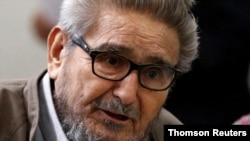Abimael Guzmán, the leader of the brutal Shining Path insurgency in Peru who was captured in 1992, died on Saturday in a military hospital after an illness, the Peruvian government said.
Guzmán, 86, died after suffering from an infection, Justice Minister Aníbal Torres said.
Guzmán, a former philosophy professor, launched an insurgency against the state in 1980 and presided over numerous car bombings and assassinations in the years that followed. After his capture, he was sentenced in life in prison for terrorism and other crimes.
President Pedro Castillo tweeted that Guzmán was responsible for taking countless lives.
"Our position condemning terrorism is firm and unwavering. Only in democracy will we build a Peru of justice and development for our people," Castillo said.
Guzmán preached a messianic vision of a classless Maoist utopia based on pure communism, considering himself the "Fourth Sword of Marxism" after Karl Marx, Vladimir Ilyich Lenin and Mao Zedong. He advocated a peasant revolution in which rebels would first gain control of the countryside and then advance to the cities.
Guzmán's movement declared armed struggle on the eve of Peru's presidential elections in May 1980, the first democratic vote after 12 years of military rule.
Prison built for him
Throughout the 1980s, the man known to his followers as Presidente Gonzalo built up an organization that grew to 10,000 armed fighters before his capture inside a Lima safehouse by a special intelligence group of the Peruvian police backed by the United States. Since then, he was housed in a military prison on the shores of the Pacific that was built to hold him.
By the time Guzmán called for peace talks a year after his arrest, guerrilla violence had claimed tens of thousands of lives in Peru, displaced at least 600,000 people and caused an estimated $22 billion in damage.
A truth commission in 2003 blamed the Shining Path for more than half of nearly 70,000 estimated deaths and disappearances caused by various rebel groups and brutal government counterinsurgency efforts between 1980 and 2000.
Yet it lived on in a political movement formed by Guzmán's followers that sought amnesty for all "political prisoners," including the Shining Path founder. The Movement for Amnesty and Fundamental Right failed, however, to register as a political party in 2012 in the face of fierce opposition from Peruvians with bitter memories of the destruction brought by the Shining Path.
In its songs and slogans, the Shining Path celebrated bloodletting, describing death as necessary to "irrigate" the revolution.
Its militants bombed electrical towers, bridges and factories in the countryside, assassinated mayors and massacred villagers. In the insurgency's later years, they targeted civilians in Lima with indiscriminate bombings.
The Shining Path was severely weakened after Guzmán's capture and his later calls for peace talks. Small bands of rebels have nevertheless remained active in remote valleys, producing cocaine and protecting drug runners.




